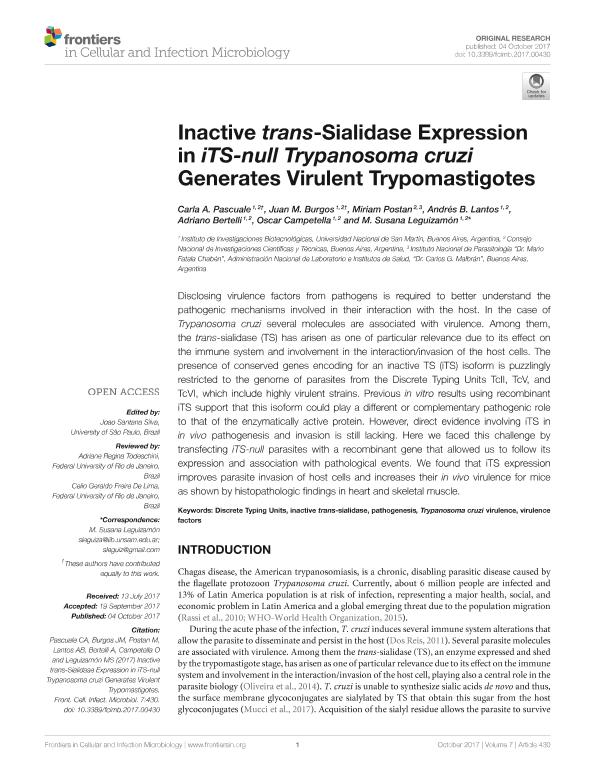Artículo
Inactive trans-sialidase expression in iTS-null Trypanosoma cruzi generates virulent trypomastigotes
Pascuale, Carla Antonela ; Burgos, Juan Miguel
; Burgos, Juan Miguel ; Postan, Miriam
; Postan, Miriam ; Lantos, Andrés Bernardo Gabriel
; Lantos, Andrés Bernardo Gabriel ; Bertelli, Adriano
; Bertelli, Adriano ; Campetella, Oscar Eduardo
; Campetella, Oscar Eduardo ; Leguizamon, Maria Susana
; Leguizamon, Maria Susana
 ; Burgos, Juan Miguel
; Burgos, Juan Miguel ; Postan, Miriam
; Postan, Miriam ; Lantos, Andrés Bernardo Gabriel
; Lantos, Andrés Bernardo Gabriel ; Bertelli, Adriano
; Bertelli, Adriano ; Campetella, Oscar Eduardo
; Campetella, Oscar Eduardo ; Leguizamon, Maria Susana
; Leguizamon, Maria Susana
Fecha de publicación:
10/2017
Editorial:
Frontiers Media S.A.
Revista:
Frontiers in Cellular and Infection Microbiology
ISSN:
2235-2988
Idioma:
Inglés
Tipo de recurso:
Artículo publicado
Clasificación temática:
Resumen
Disclosing virulence factors from pathogens is required to better understand the pathogenic mechanisms involved in their interaction with the host. In the case of Trypanosoma cruzi several molecules are associated with virulence. Among them, the trans-sialidase (TS) has arisen as one of particular relevance due to its effect on the immune system and involvement in the interaction/invasion of the host cells. The presence of conserved genes encoding for an inactive TS (iTS) isoform is puzzlingly restricted to the genome of parasites from the Discrete Typing Units TcII, TcV, and TcVI, which include highly virulent strains. Previous in vitro results using recombinant iTS support that this isoform could play a different or complementary pathogenic role to that of the enzymatically active protein. However, direct evidence involving iTS in in vivo pathogenesis and invasion is still lacking. Here we faced this challenge by transfecting iTS-null parasites with a recombinant gene that allowed us to follow its expression and association with pathological events. We found that iTS expression improves parasite invasion of host cells and increases their in vivo virulence for mice as shown by histopathologic findings in heart and skeletal muscle.
Archivos asociados
Licencia
Identificadores
Colecciones
Articulos(IIB-INTECH)
Articulos de INST.DE INVEST.BIOTECNOLOGICAS - INSTITUTO TECNOLOGICO CHASCOMUS
Articulos de INST.DE INVEST.BIOTECNOLOGICAS - INSTITUTO TECNOLOGICO CHASCOMUS
Citación
Pascuale, Carla Antonela; Burgos, Juan Miguel; Postan, Miriam; Lantos, Andrés Bernardo Gabriel; Bertelli, Adriano; et al.; Inactive trans-sialidase expression in iTS-null Trypanosoma cruzi generates virulent trypomastigotes; Frontiers Media S.A.; Frontiers in Cellular and Infection Microbiology; 7; 10-2017; 1-12
Compartir
Altmétricas



